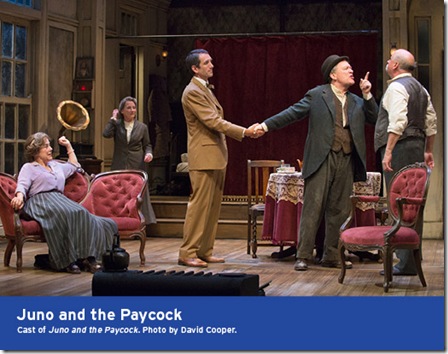The Shaw Festival has another triumph with Juno And The Paycock: Reviewed by Jamie Portman
Juno and the Paycock. Photo. David Cooper
NIAGARA-ON-THE-LAKE, Ont. — It’s only a cameo appearance, but when the remarkable Jennifer Phipps shows up in the second act of Juno And The Paycock as a bereaved old Irish mother mourning the son who has become a victim of the Irish Civil War, you can hear a pin drop.
Phipps is with us for only a few moments in the role of the mourning Mrs. Tancred, her head held high despite everything that’s happened to her, but that’s all the time she needs to communicate not just grief but stoicism and resilience in the face of terrible loss. It’s always at the most personal level that we can become really aware of the price exacted by human conflict, and this venerable Shaw Festival veteran delivers.
Indeed, the courage and fortitude of the women are what ultimately inspires us as we’re drawn into the grubby, deceitful, festering world of Sean O’Casey’s play about an impoverished Dublin household’s response to the promise of an inheritance and, with it, a better life. But as the Boyle family embarks on a reckless spending spree before it has seen a single coin from this looming windfall, its situation remains precarious. In the Ireland of 1922, the troubles are raging. Captain Jack Boyle, the “paycock” of the title and the nominal head of the family, remains a drunken, worthless fraud. His one-armed son, Johnny, a casualty of the independence conflict, a brooding misfit in fear for his life because of an act of treachery, knows that one day the Irish Republican Army will come knocking. New pieces of furniture, acquired on the never-never, may be arriving in the shabby tenement home of the Boyles — but hanging over them like a boulder is the probability that it will all come crashing down.
If there is some sort of linchpin figure in all this it is the mother — the Juno of the title. This is Mary Haney in a portrayal so careworn that you wonder how she survived. But she has survived — and that’s the point. “Twenty years ago, she must have been a pretty woman,” the play observes. Now, at 45, she exudes “listless monotony and harassed anxiety.” But again, she has survived. She’s still indomitable after two decades of marriage to a feckless, boozing husband, still functioning in the midst of a war she despises, still waging fierce battle against despair and the reality of a grinding poverty that seemingly knows no end.
Haney triumphs in this role — particularly at that heartbreaking moment when Juno Boyle also becomes a mourning mother, confronted with the fact of her son’s fate at the hands of the IRA. Ultimately her prickly courage and fortitude prevail — for her, always, tomorrow is another day — but, thanks to this performance, you glimpse the relentless emotional scarring, and marvel at the power that sustains her.
Jackie Maxwell’s direction of O’Casey’s great play can be merciless at times — beyond the physical squalor of designer Peter Hartwell’s grim and soulless set, there’s a moral squalor as well in much of what’s happening. But the production never loses touch with the play’s ravaged heart. There’s nothing blinkered about this Juno And The Paycock, but it is imbued with a rough compassion.
That compassion even extends to the perennially unemployed Jack Boyle, portrayed by Jim Mezon with all the bluster, bombast and bravado of the quintessential hollow man. Mezon, a formidable actor, makes such a strong impact with his first entrance on the Court House Theatre stage that it’s like an assault. It leaves you wondering whether he can take the performance anywhere after this. But Mezon, whose subtlety is often underestimated, is adept at spinning variations on the boozing and lying, the posturing and preening while also underscoring Jack’s futile yearning* to be “somebody.” The men don’t fare well in O’Casey’s play — one of the reasons its first performance provoked riots — but Mezon ensures a tinge of pathos in this portrayal.
There is equally fine work from Benedict Campbell as Boyle’s parasitical drinking buddy, Joxer Daly. This amoral monster with the ingratiating grin has his own pragmatic code when it comes to the Civil War: “It’s better to be a coward than a corpse.” He’s a terrible influence on Boyle, clinging to his friend like a leech, flattering him shamelessly, stroking his ludicrous ego, while remaining untrustworthy to the nth degree. In a sense, Campbell’s Joxer is the prototype “hanger-on.” And he seems very much to belong in this world. Crumpled yet tenacious, he reminds you of J.M. Kerrigan’s performance as Terry, the fawning opportunist who attaches himself to Victor McLaglen’s doomed Gypo Nolan in John Ford’s classic film version of Liam O’Flaherty’s The Informer.
Marla McLean is touching in the role of young Mary Boyle. Charlie Gallant struggles somewhat with the character of her embittered and fearful brother — but the character seems underwritten. Gord Rand brings a touch of appropriate inscrutability to the English lawyer who captures Mary’s heart and then rejects her, Lorne Kennedy has an amusing cameo as an anxious haberdasher, and Corrine Koslo has her own shining moments as a goodhearted neighbour.
In brief another distinguished production that demonstrates the astonishing breadth and versatility of the Shaw Festival acting company.
(Juno And The Paycock continues to Oct. 12. Ticket information at 1 800 511 7429 or shawfest.com)
